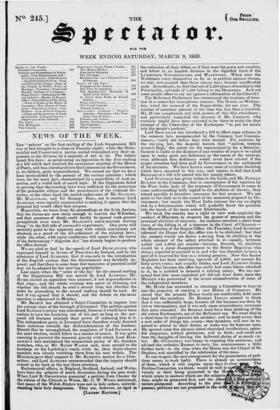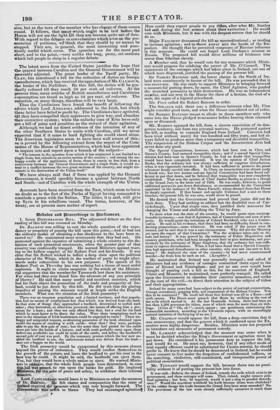NEWS OF THE WEEK.
THE "palaver" on the first reading of the Irish Suppression Bill was at last brought to a close on Tuesday night; when the Ministerialist and Conservative parties united triumphed over their opponents in the division by a majority of 466 to 89. The debate lasted five days : so persevering an opposition to the first reading of a bill which had received the unanimous sanction of the House of Peers, and was introduced into the Commons by the Government, is, we believe, quite unprecedented. We cannot say that we have been much edified by the perusal of the various speeches ; which were, for the most part, characterized by a superfluity of rash assertion, and a woful lack of sound logic. If the Opposition failed in proving that the existing laws were sufficient for the protection of the peaceable citizen and the punishment of the criminal disturber, on the other hand the united endeavours of Tar. STANLEY, Mr. MAC AUL AY, and Sir ROBERT PEEL, not to mention Lord ALTHORP, were equally unsuccessful in making it appear that the proposed bill would effect that purpose. Meanwhile, we learn from the proceedings at the Irish Assizes, that the Juries are now ready enough to convict the Whitefeet, and that sentence of death could hardly be passed with greater promptitude even were Mr. STANLEY S court-martials moving along "in the full tide of successful experiment." One party will naturally point to the apparent ease with which convictions are obtained, as a proof of the all-sufficiency of the existing laws ; while the other, with equal confidence, will assert that the terror of the forthcoming " Algerine Act" has already begun to produce the effect desired.
We are glad to find by the speech of Lord DUNCANNON, who expressed himself in favour of Poor-laws for Ireland, and by the admission of Lord ALTHORP, that it was only to the introduction of the English system that the Government was decidedly opposed; and that there is some hope that measures of practical relief may yet be adopted for her starving population. Last night, when the" order of the dayfor the second reading of the Suppression Bill was moved by Lord ALTHORP, Mr. HUME started an opposition very unusual, if not unprecedented in that stage ; and the whole evening was spent in debating, not whether the bill should be read a second time, but whether the order for proceeding to the second reading should be read. At last it was agreed • that it should; and the debate on the main question is adjourned to Monday.
Mr. BE NETT has obtained a Select Committee to inquire into the corrupt state of the borough of Liverpool. The petition against Lord SANDON'S return was abandoned, because it would have been useless to turn his Lordship out of his seat as long as the perjured old freemen retained their power of replacing him in it. The independent party in Liverpool have therefore wisely directed
their exertions towards the disfranchisement of the freemen.•Should that be accomplished, the expulsion of Lord SANDON, at the next election, would follow as a matter of course. It was quite amusing to perceive the innocent gravity a ith which Lord HARROWBY'S heir maintained the immaculate purity of the drunken wretches, who, as Mr. RIGHT WASON said, were carried to the hustings on his Lordship's coach, while he, their freely-chosen member, was closely watching them from his seat within. The Ministers gave their support to Mr. BENETT'S motion for a Committee; and Lord ALTHORP recommended that the inquiry should extend as far back as the last three elections.
Ecclesiastical affairs, in England, Scotland, Ireland, and Wales, have been the subjects of much discussion during the past week. When Loyd R. GROSVENOR presented a petition from Chester for the reform of the Church in Wales, Mr. C; W. WYNN mentioned, that many of the Welsh Rectors were not in holy orders, notwithstanding their holy designation. They are, however, as rigid in the collection of their tithes, as if they wore the gown and surplice, and follow at no humble distance in the dignified track of the LUXMORES, GOODENOUGHS, and MaJanniEs. When once the Welshmen rouse themselves so far as to petition against abuses, we may rest assured 'that those abuses have become insufferably rank. Accordingly, we find that out of 2,200 places of worship in the Principality, upwards of 1,400 belong to the Dissenters. And yet some people affect to cry out against a reformation of the Church !
The Reformed Parliament has commenced 'the business of taxation in a somewhat inauspicious manner. The House, on Wednesday, voted the renewal of the Sugar-duties for one year. The number of members present at the time was less than a hundred. Mr. HUME complained, and with justice, of this thin attendance ; and particularly remarked the absence of Mr. COBBETT, who certainly might have been expected to be there to resist the first attempt of the Chancellor of the Exchequer "to put his hands into the people's pockets."
Lord BROUGHAM has introduced a bill to effect some reforms in the common law, recommended by the Common Law Commissioners,—verily not before they were wanted. For instance, by • the existing law, the despotic maxim that " nullum tempus occurrit Regi," the surety (or his representative) for a ReceiverGeneral is liable at the distance of any number of years to be called upon to make good any deficiency in the assets of the receiver, ' even although that deficiency would never have existed if the, proper attention had been paid by Government to the settlement of his accounts. We have known some cases of extreme hardship which have occurred in this way, and rejoice to find that Lord BROUGH AM'S bill will amend this law among others.
Lord S UFFIELD has given notice in the Lords, and Mr. POWELL BUXTON in the Commons, that in consequence of the rejection by the West India body of the proposals of Government to come to some understanding with regard to the abolition of slavery, theyintend speedily to introduce measures for that purpose. We are quite in the dark as to the extent of the measures proposed by Government; but surely the West India interest has run no slight risk by a determination which will probably throw the question into the hands of the more ardent Abolitionists.
We think' the country has a right to view with suspicion the conduct of Ministers as respects the grants of pensions and the promised abolition of sinecures. An instance occurred a short time since, of the falling in of a sinecure in the Court of Chancery— the Mastership of the Report Office. On Thursday, Lord ALTHORP informed the House that this office was to be abolished ; but that the country would not derive a saving fromits abolition to the whole amount of the salary attached to it—namely, between 4,000/. and 5,000/. per annum—because, forsooth, its abolition would be a great disappointment to the Senior Registrar, who always expected to succeed to it, and who was therefore to have a part of it reserved for him as a retirino. pension. Now this Senior Registrar has been receiving upward; of 4,000/. per annum for forty-seven years; and actually thinks, and Lord ALTHORP thinks so too, that because his office has really had some labour attached to it, he is entitled to -demand a retiring salary. We are surprised that this most impudent job (lid not draw, down upon the Minister who patronized it the severe animadversion of some of the independent members. Mr'. HUME has succeeded in obtaining a Committee to inquire into the propriety of erecting a new House of Commons. He stated that the present House would not comfortably hold more than half the members. Sir ROBERT INGLis seemed to think that it was sufficiently large, because all the business was done by 150 or 200 members, and it was only upon extraordinary occasions that more attended. Sir ROBERT must have been thinking of the old rotten Parliaments, not of the Reformed one. We trust that in a short time he will perceive his mistake; and be made aware that a new order of things has arisen—that members will now be required to attend to their duties, or make way for honester men. He sported some fine phrases about cherished recollections, splendid eloquence, noblest patriotism, and so forth; and could not bear the thoughts of leaving the hallowed shrine of so much virtue. Mr. O'CONNELL was happy in exposing this nonsense, and advised the orthodox Baronet to carry his reminiscences a little further back—to the time when the House was the Chapel of St. Stephen, and sanctified by the celebration of the mass. In one respect, the new arrangement for' the presentation of petitions seems to work badly. There is already an accumulation of them, which it will require many days to clearMr The Petition Committee, we think, would do well to a ArN viously to their being presented to the Ho44r which relate to matters which are the subjects time, might be presented first; and the other nature postponed. According to the plan prtment, petitions are not presented in the ord
rive, but as the turn of the member who has charge of them comes round. It follows, that litany which ought to he laid before the Rouse will not see the light till they are become quite out of date. With regard to the debates or conversations which arise on the presentation of petitions; we' think that they should by ncr means be stopped. They are, in general, the most interesting and practically useful which occur. The speeches are for the most part short, and to the point,—very unlike the long, prosy, set orations which lull people to sleep in a regular debate.



















